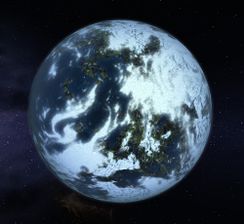Difference between revisions of "Planet Miyazaki"
m |
m (Pic file fixed. Category added) |
||
| Line 2: | Line 2: | ||
{{Planet Infobox | {{Planet Infobox | ||
| name = Planet Miyazaki | | name = Planet Miyazaki | ||
| − | | image = Miyazaki.jpg | + | | image = Planet Miyazaki.jpg |
| − | | owner = [[Samura]] | + | | owner = [[Samura Industries]] |
| system = [[Tottori]] | | system = [[Tottori]] | ||
| sector = 6F | | sector = 6F | ||
| Line 15: | Line 15: | ||
| escape_velocity = 11.01km/sec | | escape_velocity = 11.01km/sec | ||
}} | }} | ||
| − | Discovered in 810, Planet Miyazaki, along with [[Planet Tomioka]] are the centerpieces of [[Samura]]'s plans to re-monopolize the [[Kusari]] [[ | + | Discovered in 810, Planet Miyazaki, along with [[Planet Tomioka]] are the centerpieces of [[Samura]]'s plans to re-monopolize the [[Kusari]] [[Food]] markets. A planet with optimal growing conditions, this pristine planet rivals [[Planet Gaia|Gaia]] in it's beauty, but not in practicality. The planet has an extremely strong magnetosphere, probably from an unusually large iron concentration in its core. While this provides an excellent shield against cosmic radiation and allowed life to develop earlier then normal on the planet, it also prevents any close-orbit construction, such as a [[Docking Ring]]. Small, custom shielded landers are the only craft that can safely dock to Miyazaki. |
| − | With a healthy biosphere but a difficult supply chain, | + | With a healthy biosphere but a difficult supply chain, Samura has built a small agricultural colony on the planet, with a supply station in high orbit to transfer small amounts of goods to and from the surface. The company puts the number of employees on-planet at 20.000 in a single colony, rising steadily. |
| + | |||
| + | [[Category: Kusari]] | ||
| + | [[Category: Samura Industries]] | ||
Revision as of 21:07, 19 November 2018
This article has not been verified to be up to date for the latest version of the Discovery mod. The last edit was made on 19.11.2018 (DD/MM/YYYY). You may help by updating it, often by using the code generator.
| Planet Miyazaki | |
| Owner | Samura Industries |
| Location | 6F, Tottori |
| Technical information | |
| Docking | No |
| Terrain | Terrestrial |
| Diameter |
|
| Mass | 5.96 x 10e24 kg |
| Temperature | -34°C to 52°C |
| Escape velocity | 11.01km/sec |
Discovered in 810, Planet Miyazaki, along with Planet Tomioka are the centerpieces of Samura's plans to re-monopolize the Kusari Food markets. A planet with optimal growing conditions, this pristine planet rivals Gaia in it's beauty, but not in practicality. The planet has an extremely strong magnetosphere, probably from an unusually large iron concentration in its core. While this provides an excellent shield against cosmic radiation and allowed life to develop earlier then normal on the planet, it also prevents any close-orbit construction, such as a Docking Ring. Small, custom shielded landers are the only craft that can safely dock to Miyazaki.
With a healthy biosphere but a difficult supply chain, Samura has built a small agricultural colony on the planet, with a supply station in high orbit to transfer small amounts of goods to and from the surface. The company puts the number of employees on-planet at 20.000 in a single colony, rising steadily.
